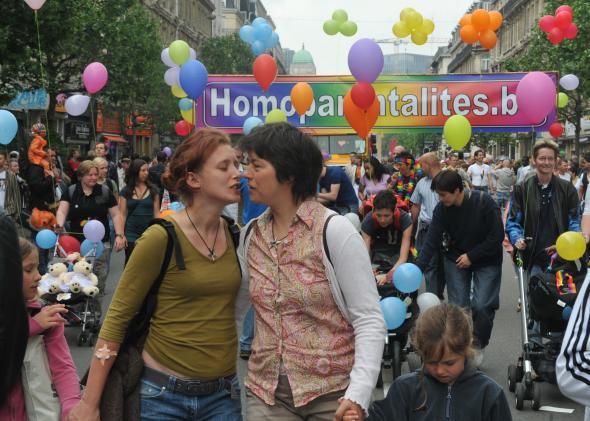Here we go again. In what appears to be a mini-meme, another child of a same-sex couple has “come out” about her experience and is trying to turn her pain into policy. (A quartet of these folks, who are urging the U.S. Supreme Court to uphold same-sex marriage bans, were profiled by Zack Ford at ThinkProgress last month.) Now, in a piece for the Federalist, Heather Barwick argues that same-sex marriage should be prohibited. While no one’s story should be discounted, her arguments aren’t coherent. No one should be beguiled into thinking otherwise.
Barwick was the child of a mother and a father, but both parents knew that her mom was a lesbian, so—surprise!—the relationship didn’t last. After the couple split, dad rarely came around. “He wasn’t a great guy,” Barwick says. Her mom ended up in a long-term relationship with another woman, and, it seems, Barwick was raised “surrounded by women who said they didn’t need or want a man.”
Once a committed crusader for marriage equality, of late Barwick has had a change of heart. While she continues to love, “so much,” the gays, she now feels that same-sex unions subvert the natural order. When she watches her four kids “loving and being loved by their father each day,” she can “see the beauty and wisdom in traditional marriage and parenting.”
Unlike the so-called “quartet of truth,” Barwick isn’t a hater. That’s why her piece stands to gain attention from fair-minded people. But how does she get from her observations about her own family to her anti-equality stance? After reading the piece a few times, I’m still not sure.
Her position seems to be the outgrowth of a combination of personal pain and a wholly misinformed take on the social science research. Barwick complains that, unlike adopted kids and children who are the product of divorce, those raised by same-sex parents have been “scared” into not speaking up about their pain. Who’s scaring them, though? It seems that this particular Heather with two mommies felt that she couldn’t speak up sooner, and that’s unfortunate. People’s stories should be told, but they are just that—personal accounts. Change a few facts—put her dad back in the picture, give her two moms who were more welcoming to men than she claims hers were—and maybe the resentment that seems to have given rise to her feelings doesn’t exist.
If we take Barwick to mean that her pain and longing for a dad requires same-sex marriages to be banned, does she also favor doing away with no-fault divorce—because, as she notes, that, too, can be tough on kids? And while it really is unfortunate that Barwick’s dad essentially disappeared, how, exactly, would banning same-sex marriage have brought a new father into her life? Indeed, her mother and the other woman who raised her weren’t married because that wasn’t legal. Is Barwick saying things would have been worse for her if they had married? I hope not, because that makes no sense. As Justice Anthony Kennedy observed in United States v. Windsor, a law that denies marriage rights to gay and lesbian couples “humiliates tens of thousands of children being raised by same-sex couples.” And perhaps Barwick’s parents would have felt more embraced by society and less likely to retreat into the all-women shell in which she describes herself as having been raised if their relationship had been legally recognized. In the end, Barwick’s attempt to generalize from her own, idiosyncratic experience to the conclusion that our kids are “hurting” falls flat.
Perhaps realizing that her pain is a poor policy prescription, Barwick states flatly that “the best and most successful family structure is one in which kids are being raised by both their mother and father.” But it should not require repeating at this late date that the studies showing an advantage for kids raised in traditional mother-and-father-led households didn’t compare such families to those headed by gay and lesbian couples. (Read Nathaniel Frank’s Slate piece if you need a quick primer on the subject.) Indeed, Barwick herself is conflicted, at one point acknowledging that her mother was “one of the best” and recognizing that plenty of traditional marriages are disastrous—apparently including the one her mom and dad were in.
I don’t doubt Barwick’s sense of loss. But to use that as a reason to oppose same-sex unions isn’t just incoherent. It’s also not very nice to the two women who raised her.
